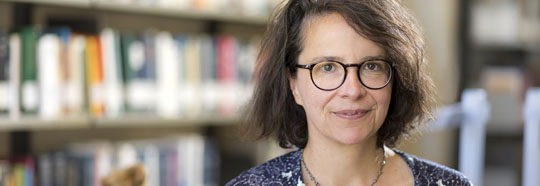Shedding light on the grand narrative
Freiburg, Sep 19, 2017
Even though science topics are in the majority, academics from any subject may apply for a European Research Council grant. Dr. Catherine König-Pralong, who specializes in the History of Philosophy at the University of Freiburg, applied in the interdisciplinary theme panel "Studies of the Human Past" and in 2013 received a Consolidator Grant for experienced researchers of 1.22 million euros. The University of Freiburg is celebrating the 10th anniversary of the ERC Grants scheme and the University's 50 Grant winners with a look at some selected projects. In a special series, we present ten such winners.
 Historian of Philosophy Catherine König-Pralong aims to show how academics in the 18th and 19th centuries reconstructed the Middle Ages and its thought as a story of decline
Historian of Philosophy Catherine König-Pralong aims to show how academics in the 18th and 19th centuries reconstructed the Middle Ages and its thought as a story of decline
Photo: Jürgen Gocke
In her project "Medieval Philosophy in Modern History of Philosophy" (MEMOPHI), König-Pralong and an international team are investigating how academics in the 18th and 19th centuries - from their standpoint in the Enlightenment - reconstructed the Middle Ages and its thought as a story of decline, because in their understanding religion instead of critical reason dominated thinking in the medieval period. The history of philosophy they wrote served to legitimize the superiority of the occident. This manner of thinking is still around today - that is why researching it helps us to draw conclusions about today's political and social conditions.
Even today, the Middle Ages are considered a dark epoch of backwardness, in which Greek philosophy was repressed and religion and the church dominated all walks of life. The widely accepted view is that not until the Enlightenment were the writings of Plato rediscovered, Aristotle correctly interpreted, and Greek philosophy made into the foundation stone of Western rationality. König-Pralong aims to show with her work that this view is primarily based on the stance of 18th- and 19th-century academics. "In this period the grand narrative arose which was to structure the collective memory," says König-Pralong. The dominant belief was that Europeans were the only ones able to think freely, rationally, and independently, because they separate reason and religion. The apparent logical assumption was that Europe was superior.
Shaping the past
Until today, the origins of this grand narrative have never been questioned. The team is researching in detail how the historians of philosophy in the early modern age reconstructed, evaluated, and criticized medieval authors. This was also the age of the distinction of different cultures. "Semitic peoples were linked with religion, Asians with mysticism, and Europeans with reason." Concepts of race, which were first introduced by the philosopher Immanual Kant, also found a place in the history of the time. On this basis, the academics also followed a strategy of downplaying or outright denying the influence of Arab philosophical culture in Europe. "Even though it is a fact that Arab and European philosophy continually enriched one another." But such facts did not fit with the way Enlightenment historians of philosophy saw the world. With their academic strategies they were able to rule the past and to shape it according to their own ideas. "They said that Enlightenment ideology was unbiased - yet that belief is part of its bias."
König-Pralong and her team are using all histories of philosophy published since 1700 as their sources. That was the era in which the discipline began. The focus is on works in German, French, and Italian. Comprehensive works began to appear around 1750. "We also use letters and lecture scripts," says the researcher. Additional sources are polemics and reviews, which played an important role at that time.
 Histories of philosophy, lecture scripts, correspondence, polemics, and reviews - the team draws on a wide variety of different sources.
Histories of philosophy, lecture scripts, correspondence, polemics, and reviews - the team draws on a wide variety of different sources.
Photo: Jürgen Gocke
Detours
König-Pralong is currently researching Karl Witte, who was actually a Professor of Law, but who became known for his work on the Italian poet Dante Alighieri. "With Witte you can see and understand the process whereby critical editions were prepared in the 19th century," she says. He was in contact with many Dante researchers in Italy, with whom he compared copies in order to find the best variation of the text. Because he had a low opinion of philosophy, he didn't think much of Dante's early philosophical writings. That drew the attention of other academics to Dante's philosophical works; they saw the value in them and interpreted them in a new light - as well as the philosophical observations in his prosaic writings. This example therefore shows what detours history of philosophy writings sometimes took.
Overall, Catherine König-Pralong sees her research on a metalevel. "There are many disciplines such as politics, culture, social sciences and the humanities which play roles in it," she says, and you can only get a unified field if you consider them all. She believes in interdisciplinarity. She sees it as an academic necessity in order to arrive at well-founded results.
Petra Völzing

